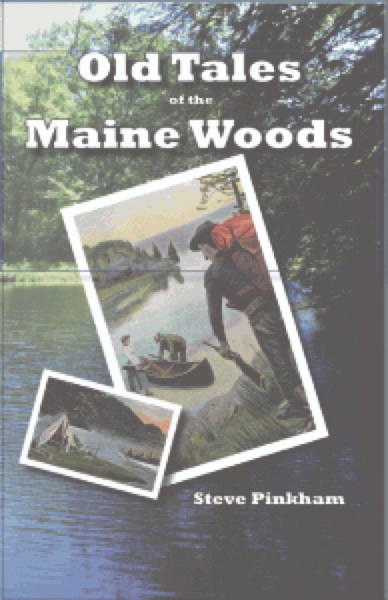From the pages of an old (circa 1860) novel, a trapper by a campfire introduces his story: “It don’t run so much to the great and terrible as the small and curious.”
That’s just the range of yarns that Steve Pinkham has resurrected in his new book. Pinkham, who grew up in western Maine, collects old articles about the Maine woods. With more than 22,000 in his archive, the 50 items in “Old Tales of the Maine Woods” are the tip of the iceberg.
Most of them were written for magazines — Forest and Stream, The American Sportsman, Shooting and Fishing — in the second half of the 19th century, a time when a spell in the Maine woods was a rare new adventure for New York professionals. Doctors and bankers relished the chance “to throw care aside for two brief weeks, and enjoy in the depths of the woods that stimulant which nature seems so ready to impart.”
Some wrote up their experiences immediately. Others recalled the days when they were excited novices, like the would-be youngblood approaching his canoe that “seemed only waiting to throw me into the lake, as the least touch swayed it about in a very ominous manner.” Even an experienced fisherman found his canoe “so tottlish that a quid of tobacco couldn’t be shifted from one jaw to the other without the danger of a capsize.”
Just getting there was a time-consuming ordeal — a combination of rail, stage and then wagon, one of which a sportsman described as “innocent of springs over an awful road of the corduroyest pattern I felt body and soul could not be kept together.”
Arrival quickly erased such memories, whether with the “ring of tin dippers, and the plates of pork and beans” of a well-earned camp dinner, or nature’s more poetic appeal: “The voices of the forest sent forth sweet songs that seemed to come from some enchanted land, lulling into that dreaminess of mind where life for the hour is an absorption into the glory of the world around.”
But the next day — or the first evening, if time allowed — was devoted to single-minded slaughter, either in the woods or on the waters. When a Boston lawyer made the trip to Rangeley for the pleasure of hiking, his guide “considered me an unusual specimen of humanity.”
The tales are pretty evenly spread between hunting and fishing. Moose, deer, caribou and bear are slain with abandon (the last often by ax, knife or other stout object in close life-or-death encounters).
Trout and salmon are hauled in gleefully in even greater numbers. An angler on Grand Lake caught 153 salmon in a week. One of a party of three, who all presumably had similar scores, he concluded his report, “I never expect to enjoy such fishing again at Grand Lake. It seems to me only a question of time when these beautiful fish become scarce, unless some further protection is given them.”
Along with hunting and fishing bravado, there are tales of bravery and endurance, encounters with wolves and catamounts — “not, in my humble opinion, a very agreeable companion to spend an evening with.” And, of course, blood-thirsty black flies.
Women relate a number of their own experiences. The most beautifully written story — which includes the death of Thoreau’s Indian guide, Joe Attien — is by Fanny Hardy Eckstorm. Eckstorm was no stranger to the woods, having accompanied her father, Manly Hardy, on many of his hunting trips.
One of the items that these early sportsmen lacked was an accurate map, and “Old Tales of the Maine Woods,” which is divided geographically into seven sections, west to east, suffers from the same omission. A map would add considerable depth to its stories.
And given the overlap in both characters and places, an index would make cross-referencing easier.
But these are quibbles compared with the inexcusable number of jarring typographical errors. If ever there was a lesson about the hazards of self-publishing, this is it. The staff at Merrimack Media appear to have relied on little other than spell-check.
It is not good enough, especially for a manuscript that must have contained a large number of optically scanned pages. I strongly urge them to employ a proofreader before the book is reprinted.
“Old Tales of the Maine Woods” is still a wonderful read. Pinkham has done every lover of Maine’s woods and waters a great service. The stories he has compiled vividly summon up a world long gone, but with just enough echoes into the present to make the book an indispensable addition for anyone with a camp in Maine.
Thomas Urquhart is a former director of Maine Audubon and author of “For the Beauty of the Earth.”
Send questions/comments to the editors.



Success. Please wait for the page to reload. If the page does not reload within 5 seconds, please refresh the page.
Enter your email and password to access comments.
Hi, to comment on stories you must . This profile is in addition to your subscription and website login.
Already have a commenting profile? .
Invalid username/password.
Please check your email to confirm and complete your registration.
Only subscribers are eligible to post comments. Please subscribe or login first for digital access. Here’s why.
Use the form below to reset your password. When you've submitted your account email, we will send an email with a reset code.